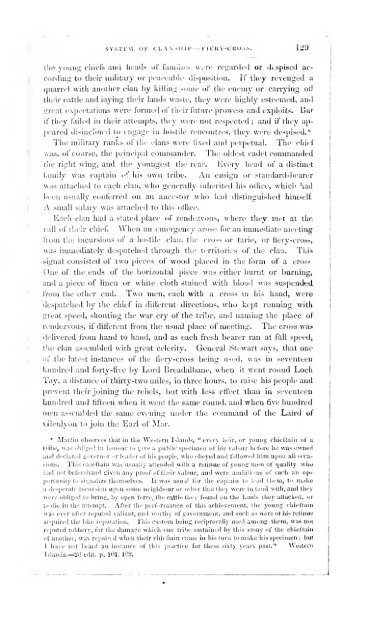A history of the Highlands and of the Highland clans : with an ...
A history of the Highlands and of the Highland clans : with an ...
A history of the Highlands and of the Highland clans : with an ...
Create successful ePaper yourself
Turn your PDF publications into a flip-book with our unique Google optimized e-Paper software.
SYSTEM OF CLANSHIP FIERY-CROSS. 129<br />
<strong>the</strong> young chiefs <strong><strong>an</strong>d</strong> heads <strong>of</strong> families were regarded or despised ac-<br />
cording to <strong>the</strong>ir military or peaceable disposition. If <strong>the</strong>y revenged a<br />
quarrel <strong>with</strong> <strong>an</strong>otlier cl<strong>an</strong> by killing some <strong>of</strong> <strong>the</strong> enemy or carrying oU<br />
<strong>the</strong>ir cattle <strong><strong>an</strong>d</strong> laying <strong>the</strong>ir l<strong><strong>an</strong>d</strong>s waste, <strong>the</strong>y were highly esteemed, <strong><strong>an</strong>d</strong><br />
great expectations were formed <strong>of</strong> tlieir future prowess <strong><strong>an</strong>d</strong> exploits. But<br />
if <strong>the</strong>y failed in <strong>the</strong>ir attempts, <strong>the</strong>y were not respected ; <strong><strong>an</strong>d</strong> if <strong>the</strong>y ap-<br />
[leared disinclined to engage iti iiostile rencontres, <strong>the</strong>y were despised.*<br />
The military r<strong>an</strong>ks <strong>of</strong> <strong>the</strong> <strong>cl<strong>an</strong>s</strong> were fixed <strong><strong>an</strong>d</strong> perpetuiil. The chief<br />
•.vas, <strong>of</strong> course, <strong>the</strong> principal comm<strong><strong>an</strong>d</strong>er. The oldest cadet comm<strong><strong>an</strong>d</strong>ed<br />
tlie right wing, <strong><strong>an</strong>d</strong> <strong>the</strong> youngest <strong>the</strong> rear. Every head <strong>of</strong> a distinct<br />
family was captain <strong>of</strong> his own tribe. An ensign or st<strong>an</strong>tlard-bearer<br />
was attached to each cl<strong>an</strong>, who generally inherited his <strong>of</strong>fice, which had<br />
been usually conferred on <strong>an</strong> <strong>an</strong>cestor who had distinguished hiraseU<br />
A small salary was attached to this <strong>of</strong>fice.<br />
Each cl<strong>an</strong> had a stated place <strong>of</strong> rendezvous, where <strong>the</strong>y met at <strong>the</strong><br />
call <strong>of</strong> tlieir chief. Wlien <strong>an</strong> emergency arose for <strong>an</strong> immediate meeting<br />
from <strong>the</strong> incursions <strong>of</strong> a hostile cl<strong>an</strong>, <strong>the</strong> cross or tarie, or fiery-cross,<br />
was immediately despatched through <strong>the</strong> territories <strong>of</strong> <strong>the</strong> cl<strong>an</strong>. This<br />
signal consisted <strong>of</strong> two pieces <strong>of</strong> wood placed in <strong>the</strong> form <strong>of</strong> a cros*<br />
One <strong>of</strong> <strong>the</strong> ends <strong>of</strong> <strong>the</strong> horizontal piece was ei<strong>the</strong>r burnt or burning,<br />
<strong><strong>an</strong>d</strong> a piece <strong>of</strong> linen or white cloth stained <strong>with</strong> blood was suspended<br />
from <strong>the</strong> o<strong>the</strong>r end. Two men, each <strong>with</strong> a cross in his h<strong><strong>an</strong>d</strong>, were<br />
despatched by <strong>the</strong> chief in different directions, who kept running <strong>with</strong><br />
great speed, shouting <strong>the</strong> war cry <strong>of</strong> <strong>the</strong> tribe, <strong><strong>an</strong>d</strong> naming <strong>the</strong> place <strong>of</strong><br />
rendez\'Ous, if different from tlie usual place <strong>of</strong> meeting. The cross was<br />
tlelivered from h<strong><strong>an</strong>d</strong> to h<strong><strong>an</strong>d</strong>, <strong><strong>an</strong>d</strong> as each fresh bearer r<strong>an</strong> at filU speed,<br />
tlie cl<strong>an</strong> assembled <strong>with</strong> great celerity. General Stewart says, that one<br />
<strong>of</strong> <strong>the</strong> latest inst<strong>an</strong>ces <strong>of</strong> <strong>the</strong> fiery-cross being used, was in seventeen<br />
hundred <strong><strong>an</strong>d</strong> forty-five by Lord Breadalb<strong>an</strong>e, when it went round Loch<br />
Tay, a dist<strong>an</strong>ce <strong>of</strong> thirty-two miles, in three hours, to raise his people <strong><strong>an</strong>d</strong><br />
prevent <strong>the</strong>ir joining <strong>the</strong> rebels, but <strong>with</strong> less effect th<strong>an</strong> in seventeen<br />
hundred <strong><strong>an</strong>d</strong> fifteen when it went <strong>the</strong> same round, <strong><strong>an</strong>d</strong> when five hundred<br />
men assembled <strong>the</strong> same evening uniler <strong>the</strong> comm<strong><strong>an</strong>d</strong> <strong>of</strong> <strong>the</strong> Laird <strong>of</strong><br />
Glenlyon to join <strong>the</strong> Earl <strong>of</strong> Mar.<br />
• Martin observes that in tlie Western Isl<strong><strong>an</strong>d</strong>s, " every heir, oi' young chieftain <strong>of</strong> a<br />
tribe, ^vas obliged in honour lo give a public specimen <strong>of</strong> his valour before he was owned<br />
<strong><strong>an</strong>d</strong> declared governor or leader <strong>of</strong> his people, who obeyed <strong><strong>an</strong>d</strong> fullowed him upon all occasions.<br />
This chieftain was usually attended <strong>with</strong> a retinue <strong>of</strong> young men <strong>of</strong> quality, who<br />
bad not Ijeforeli<strong><strong>an</strong>d</strong> given <strong>an</strong>y pro<strong>of</strong> <strong>of</strong> <strong>the</strong>ir valour, <strong><strong>an</strong>d</strong> were ambitinus <strong>of</strong> such <strong>an</strong> opportunity<br />
to signalize <strong>the</strong>mselves. It was usual for <strong>the</strong> captain to lend <strong>the</strong>m, to make<br />
a desperate incursion upon some neighbour or o<strong>the</strong>r that <strong>the</strong>y were in feud <strong>with</strong>, <strong><strong>an</strong>d</strong> <strong>the</strong>y<br />
were obUged to bring, by open force, <strong>the</strong> cattle <strong>the</strong>y found on <strong>the</strong> l<strong><strong>an</strong>d</strong>s <strong>the</strong>y attacked, or<br />
to die in <strong>the</strong> attempt. After <strong>the</strong> perform<strong>an</strong>ce <strong>of</strong> this achievement, <strong>the</strong> young chieftain<br />
was ever after reputed vali<strong>an</strong>t, <strong><strong>an</strong>d</strong> worthy <strong>of</strong> government, <strong><strong>an</strong>d</strong> such as were <strong>of</strong>his retinue<br />
acquired <strong>the</strong> like reputation. This custom being reciprocally used among <strong>the</strong>m, was not<br />
reputed robbery, for <strong>the</strong> damage which one tribe sustained by this essay <strong>of</strong> <strong>the</strong> chieftain<br />
<strong>of</strong> <strong>an</strong>o<strong>the</strong>r, was repaired when tlteir chieftain c:ime in his turn to make hisspecimen : but<br />
1 have not heard <strong>an</strong> inst<strong>an</strong>ce <strong>of</strong> this practice for <strong>the</strong>se sixty years past." Western<br />
Isl<strong><strong>an</strong>d</strong>s 2d edit. p. 101, 102.

















